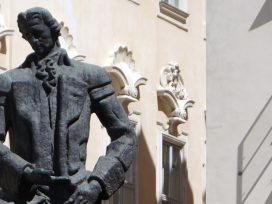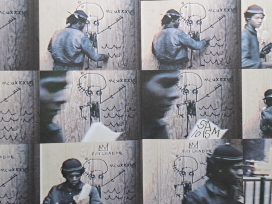
Late diagnosis and how gender bias influences the mental health of women with ADHD.

Late diagnosis and how gender bias influences the mental health of women with ADHD.

The University of Amsterdam has become a hotbed of student activism. Campuses have transformed into arenas of protest, debate and artistic expression, uniting students from diverse backgrounds in a shared pursuit of justice and human rights. What position should higher-education institutions take regarding political, religious and cultural opinions on war?


AI has made its way into young people’s lives. What opportunities does it offer, and what threats? And how can policymakers, both nationally and internationally, offer young people tools to deal with AI?

Four months into Trump’s second term and the president’s ICE raids on immigrants, triggering protests in Los Angeles now under troop surveillance, prove that ‘democracy is under assault’. Could a historic courtroom reprimand provide the necessary guidance for a moral reset?

Ivana Pejić, editor-in-chief of Kulturpunkt, explains how Kurziv and Kulturpunkt are working together to deal with funding gaps and to reconnect with their audiences outside the confines of social media.

Krytyka Polityczna is a Warsaw based online magazine, publishing house and cultural institution. In this interview with editor-in-chief Agnieszka Wiśniewska we discuss Krytyka’s vision of connecting journalists, activists, academics, artists and the wider public in Poland, as well as surviving as an independent media platform in an environment of increasingly strained and competitive funding.

Gerador is a non-profit cultural organization based in Lisbon. Clara Amante, head of Gerador’s Academy, explores questions of cultural funding and how EU projects are helping Gerador develop their methods of cultural and journalistic engagement.

Voxeurop is an independent online media outlet based in France. Founded by a team of journalists from across Europe, Voxeurop is pan-European at its core. Paul Salvanès, CEO of Voxeurop, explains how the platform began and how it is sustained by a dedicated readership and its passion for Europe.

An emotive rift exists between being drafted and signing up for military service. Those who prioritize family responsibilities, education and skills, and non-violence aren’t backing the opposition. Defence comes in many forms. Could lessons from Ukraine’s mobilization inform the recruitment challenges potentially facing the rest of Europe?

For those who suffered the consequences of Yalta’s division of Europe, the Helsinki Final Act brought grounds for optimism. Today, as Russia’s regressive war on Ukraine reopens old conflicts, it stands as a monument to European modernity.

What happens to democracy when governments court the rich and highly skilled, offering citizenship as privilege, when those in need are turned away? This year’s Speech to Europe takes the concept of ‘good’ and ‘bad’ migrants to task.

Since the collapse of Novi Sad’s train station in November, student-led protests have erupted across Serbia, inspiring a nationwide movement against corruption.

Since the mass protests in Belarus in 2020, the Lukashenka regime has undergone a totalitarian transformation. Its many instruments of repression serve a single end: to prevent civil society from becoming the driving force of another revolution.

Our unjust world is full of harrowing stories desperate to be heard. Privileged responses, though well meaning, often underscore marginalization, as historic blacking up shows. Vox Feminae asks whether contemporary human libraries, providing face-to-face discourse with real-life ‘others’, help or hinder solidarity.

After six months of protests, there are grounds for hope that the tide is turning in favour of the Serbian student movement: first, the unification of the opposition around the movement’s demand for new elections; second, the emergence of a strategic alliance between the students and the EU.